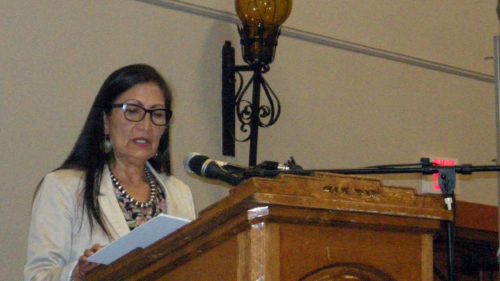SANTA FE _ A bill pending in the New Mexico Legislature would give the state game commission authority to withhold information about the location of wildlife — a move the sponsor says is necessary to ensure fair chase.
The bill, Senate Bill 383, is pending with the Senate Conservation Committee. it would allow the game commission to prescribe rules that embody the principles of fair chase which “may include prohibitions on the use of certain technologies for hunting or fishing, or may include withholding from the public specific wildlife location data that is collected by the department of game and fish or its contractors.”
Michael B. Sloane, director of the New Mexico Department of Game and Fish, said in a recent interview that the current law doesn’t allow his department leeway to withhold information that it may collect with radio collars or other technology on the location of animals.
“I don’t know if we want to sing this from the rooftops, but we have no exception currently for location data,” Sloane said. “So we have piles of animals collared out there with real-time telemetry, basically.”
Sloane said there have been instances in other states in which people have filed requests for public records for animal location data and then gone out and harvested the particular animal.
Sen. Pete Campos, D-Las Vegas, is sponsoring the measure. In a recent interview with the New Mexico Wildlife Federation, he said the increasing use of new technology in hunting makes his bill necessary.
“With today’s technology and a lot of the scouting that does take place before hunts, this in essence keeps it competitive,” Campos said.
A written analysis of the bill prepared by Stewart Liley of the game department states that the effect of not enacting it would be that “location data collected by the department, including real time data, would be available to aid in the harvesting — lawful and unlawful — (of) wildlife. Such harvest will negatively impact management driven research projects and create an unfair harvest advantage.”
Liley, a longtime biologist with the department, said it would also be possible under the existing status of the law for someone to file a request for animal location data that the department has compiled for a research management study. He said the person requesting the information could draw their own interpretations and release the data before the game department had a chance to analyze and release it on its own.
Sloane said the game commission already has authority to dictate the manner and method of what constitutes allowable hunting practices in the state.
Speaking of Campos’ bill, Sloane said, “It kind of gives them the direction to kind of think about the effect of technology on hunting, and how the principles of fair chase might be applied, and whether you’re going to some extremes to harvest an animal.
“It’s just a reminder that technology keeps advancing and there are limits to how we should be harvesting animals,” Sloane said.
Jesse Deubel, executive director of the New Mexico Wildlife Federation, said the federation supports the bill. “The federation has a long history of promoting fair chase and ethical hunting practices,” he said.



